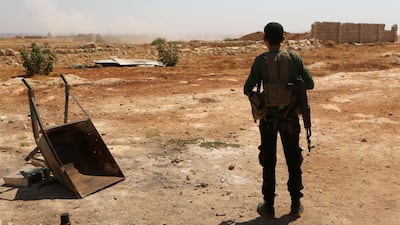Donald Trump's administration announced on Thursday it would impose sanctions on four individuals and five entities — two of which are based in the UAE — for supplying weapons and fuel to Assad's regime in Syria.
The State Department said it had sanctioned Syrian nationals Yasir ‘Abas, Adnan Al-Ali and Muhammad al-Qatirji, as well as Lebanese national Fadi Nasser, for facilitating the transfers. Sanctions were also imposed on the following entities:
1. Al Qatirji Company, based in Syria
2. Nasco Polymers and Chemicals, based in Lebanon
3. Abar Petroleum Service SAL, based in Lebanon
4. International Pipeline Construction FZE, based in the United Arab Emirates
5. Sonex Investments Ltd., based in the United Arab Emirates.
“As a result of today’s announcement, all of these individuals’ and entities’ assets within US jurisdiction are blocked, and US individuals and entities are generally prohibited from engaging in transactions with them,” State Department spokeswoman Heather Nauert said in a statement.
___________________
Read more:
Idlib residents flee ahead of feared Syrian government offensive
Syrian doctor jailed for opposing Assad faces prison again, for criticising Erdogan
___________________
She added that the “United States will continue to take concrete and forceful action to cut off material support to the Assad regime and its supporters.” In the statement she also accused the Assad regime of having “systematically arrested, tortured, and murdered tens of thousands of Syrian civilians in response to their legitimate and nonviolent calls for their freedom, rights, and political reforms.”
Providing information on the targets of the new sanctions, the Treasury Department said that the Syria-based Al Qatirji Company had shipped "weapons from Iraq to Syria.”
Mr Qatirji maintained "strong ties to the Syrian regime and facilitates fuel trade between the regime and ISIS, including providing oil products to ISIS-controlled territory,” the statement said.
Another Syrian national, Mr Abas, provided "oil and weapons imports on behalf of the Syrian regime, including involvement in the shipment of goods and military equipment from Iran to Syria on behalf of the Syrian Air Force.”
The Lebanese Mr Nasser facilitated the transfer of "financial, material, or technological support to the Syrian Company or Oil Transport” while acting on behalf of Nasco Polymers.
He also allegedly arranged the “delivery of thousands of tons of fuel to Syrian ports" and received millions of dollars in exchange.
The US Treasury said the Lebanese company Abar Petroleum evaded sanctions by importing crude oil and petroleum products into Syrian ports. “It brokered over $30 million of shipments of petroleum products to Baniyas, Syria, including gasoline, gasoil, and liquefied petroleum gas,” the statement said.
Nasco Polymers and UAE-based Sonex Investments "were designated for facilitating shipments to Syrian ports by serving as consignees and chartering the vessels.”
UAE-based Sonex Investments “acted as a buyer, consignee, or charterer for shipments of crude oil and petroleum products discharged at Baniyas, Syria." The statement makes reference to a shipment of over 90,000 metric tons of fuel oil delivered in May 2017 and another shipment of over 43,000 metric tons of crude oil in November 2017.
IPC, also based in UAE, was designated for being owned or controlled by Hesco Engineering. “Hesco Engineering is owned by George Haswani, one of the Syrian regime’s middlemen for dealings between the Government of Syria and ISIS”, the US Treasury said. IPC allegedly "facilitated payments originating in Syria."

